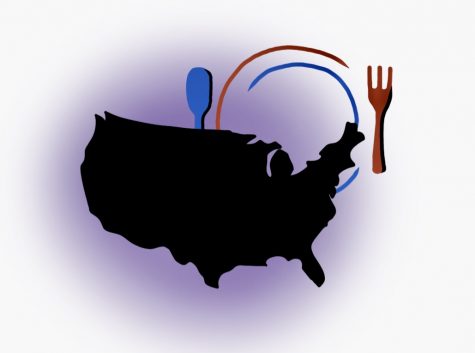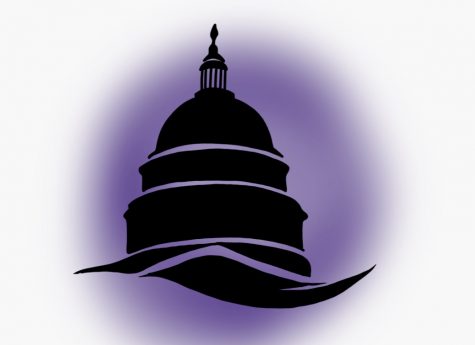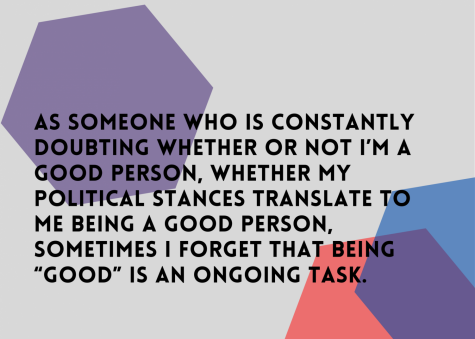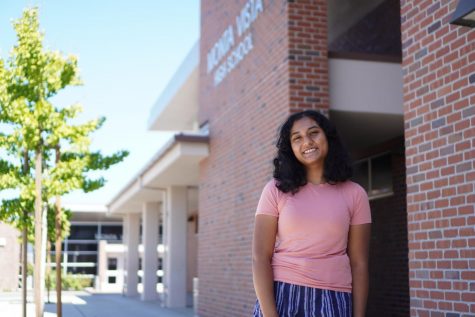Intellectual elitism
The hyperfocus on political correctness among the MVHS community hinders productive discussion
January 17, 2021
My parents didn’t seem to care about the presidential election.
It frustrated me — I was constantly refreshing the New York Times for live updates, texting and calling people about it, distractedly doing homework without really processing the words on my assignments because the only thing I could think about were the vote counts, the electoral college, the swing states.
And when I sat down at the dinner table on Election Night, asking whether they had been following the news, I was confused, and soon thereafter, annoyed, when they said no. I grew frustrated as they dismissed my predictions and disinterestedly listened to my updates. I couldn’t fathom why they were unwilling to be more engaged. But before labelling them as apathetic, I asked why.
They said it wasn’t that they didn’t care; it was just that, as Indian immigrants on work visas, they doubt a Biden administration will offer more than meager support to speed along their Green Card processes and accept them as American citizens. They doubt a presidential election will change the way this country views them — merely as immigrants that enhance the workforce (in their case, in the tech industry). And although they hope America’s president-elect will be someone who isn’t openly hostile towards immigrants and encouraging of white supremacists, they remain largely indifferent when it comes to national politics.

I was quick to label their apathy as ignorance, perhaps even prejudice. And my inclination to jump to conclusions, fitting people in boxes when they aren’t activists or the “correct” type of activist, is emblematic of a problem rampant in our MVHS community — intellectual elitism.
The political ideologies of the majority of the MVHS population lean liberal, and identifying as a liberal myself, it used to be easy for me to join the chorus of people condemning American corporate capitalism or demanding universal healthcare or free college education. But lately, it seems as if this chorus has become more selective, to the point where this hyperfocus on liberalism and political correctness has led to increasingly, supposedly high-minded rhetoric, claiming that all conservatives are prejudiced, and therefore unintelligent.
The belief that there is a singular way to support a movement, one hashtag that encompasses all of its nuances, is insidious. This mentality causes us to put on blinders and reject valuable perspectives — if we want to fight for justice, we need to stop labelling the other side as stupid, and more so, recognize that issues aren’t black-and-white. There is no “other side” — there are multiple perspectives.
I’m guilty of this too — I was dismissive of my parents and frankly, sometimes I’m dismissive of other viewpoints that stray too far from mine. I labelled my parents as apathetic and therefore, diametrically opposed to my political viewpoints. I shut them out, sidestepping a conversation that could have created more nuanced understanding of all our stances.
When we MVHS students claim that any perspective other than our own is unintelligent, and therefore unworthy of respect, we isolate ourselves and create an echo chamber. We perpetuate cancel culture when we glorify our own opinions by disregarding other opinions. We often seem obsessed with visibility and self-promotion — when we brandish our views on social media and let the world know that we are allies fighting for justice, we feel a little bit more worthy. But justice is not necessarily, about, well, ourselves.
Does it matter that other people don’t know we are fighting for justice — isn’t the point that we are indeed doing so?
And more importantly, if other people hold different, less liberal views than us, does it automatically mean that they aren’t intelligent or valid — isn’t elitism a counterclaim to equality?
What happened this past week at the Capitol is a scary reminder that democracy is fragile, and as young people, it’s our job to sustain it. But we are not going to do so by having a monolithic definition for what it means to be an activist, an ally.

It is, to an extent, a privilege that many of us have the passion, time, resources and avenues through which we can contribute to social justice movements or other issues we care about — but we cannot keep doing this on a pedestal that not only enforces rigid stances, but also prevents us from engaging in critical thinking.
Because change and progress aren’t linear, and everyone is learning. Using high-minded rhetoric and neglecting other perspectives because we’ve convinced ourselves we’re on the side of justice and the right side of history does nothing valuable. We’re simply wearing a guise of righteousness.
—
When we began distance learning in March of 2020, the first show I stumbled upon and binged on Netflix was “Bojack Horseman.” On the surface, it was about a talking cartoon horse, but it was also about life and identity, who we are as people. A quote from it resonated with me:
“There’s no such thing as ‘bad guys’ or ‘good guys.’ We’re all just … guys, who do good stuff sometimes and bad stuff sometimes. And all we can do is try to do less bad stuff and more good stuff, but you’re never going to be good because you’re not bad.”
As someone who is constantly doubting whether or not I’m a good person, whether my political stances translate to me being a good person, sometimes I forget that being “good” is an ongoing task. It’s being willing to be in a constant state of unlearning and learning. And refocusing back to social and political stances, there is no one right answer to solve the problems plaguing our communities, our country and the world. Often, there is no right or wrong side — we all contribute to an intricate web of perspectives.

My parents aren’t apathetic. They’re first-generation immigrants who don’t care passionately about national politics because they feel like national politics doesn’t care about them. And looking back, I shouldn’t have judged them for it.
We need to stop being intellectual elitists and instead engage in thoughtful self-reflection, respectful questioning, or even read, listen and watch things we disagree with (our stances may remain the same, or perhaps, we’ll gain new insights and understand our world and the people in it a little bit better).
Because it is commendable that many of us feel passionately about issues, that many of us are fighting for justice. But let’s stop doing it from a pedestal.


















